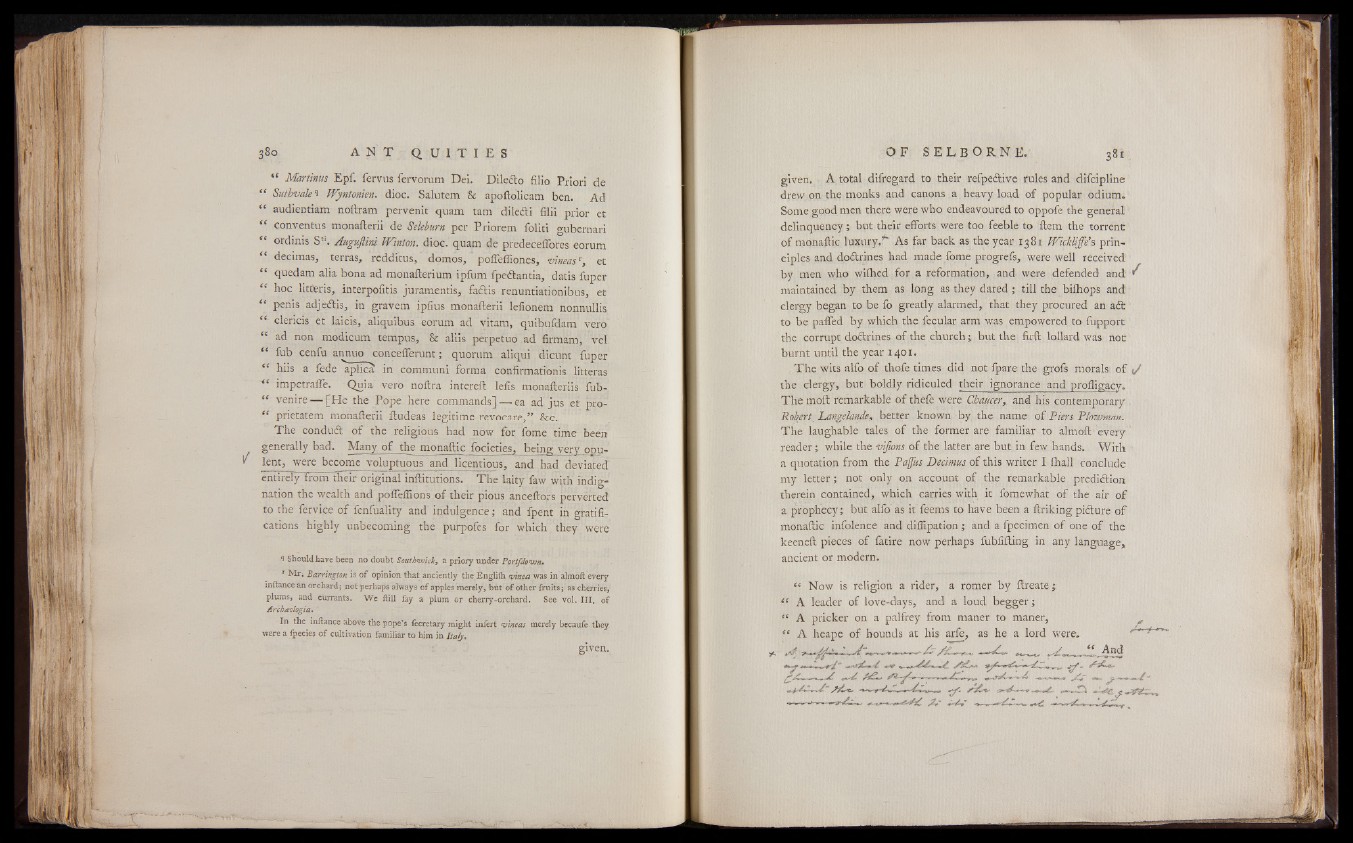
“ Martinus Epf. fervus fervorum Dei. Diledfo filio Priori de
“ Suthvalei fVyntonien. dioc. Salutem & apoftolicam ben. Ad
“ audientiam noftram pervenit quam tam diledti filii prior et
“ conventus monafterii de Seleburn per Priorem foliti gubernari
“ ordinis S'1. Augujlini Wintam. dioc. quam de predeceffores eorum
“ decimas, terras, redditus, domos, poflefEones, vineasr, et
“ quedam alia bona ad monafterium ipfum fpedfantia, datis fuper
“ hoc litferis, interpofitis juramentis, fadtis renuntiationibus, et
“ penis adjedtis, in gravem ipfius monafterii lefionem nonnullis
“ clericis et laicis, aliquibus eorum ad vitam, quibufdam vero
“ ad non modicum tempus, & aliis perpetuo ad firmam, vel
“ fub cenfu annuo concefferunt; quorum aliqui dicunt fuper
“ hiis a fede aplica in communi forma confirmationis litteras
“ impetralfe. Quia vero noftra intereft lefts monafteriis fub-
“ venire — [He the Pope here commands}— ea ad jus et pro-
“ prietatem monafterii ftudeas legitime revocare,” &c.
The condudt of the religious had now for fome time been
generally bad. Many of the monaftic focieties, being very opulent,
were become voluptuous and licentious, and had deviated
entirely from Their original inftitutions. The laity faw with indignation
the wealth and poffeflions of their pious anceftors perverted
to the fervice of fenfuality and indulgence; and fpent in gratifications
highly unbecoming the purpofes for which they were
■S Should have been no doubt Soutkwick, a priory under Portfdovm.
' M r ' Barrington is o f opinion that anciently the Engliih vinca was in almoft every
inftance an orchard; not perhaps always o f apples merely, but o f other fruits; as cherries,
plums, and currants. We Hill fay a plum or cherry-orchard. See vol. I l l , o f
Arcbaologia.
In the inftance above the pope’ s lecretary might infert vineas merely becauie they
were a fpecies o f cultivation familiar to him in Italy.
given.
given. A total difregard to their refpedtive rules and difcipline
drew on the monks and canons a heavy load of popular odium.
Some good men there were who endeavoured to oppofe the general
delinquency; but their efforts were too feeble to ftem the torrent
of monaftic luxury.* As far back as the year 1381 Wtckliffe’s principles
and dodtrines had made fome progrefs, were well received
by men who wilhed for a reformation, and were defended and ^
maintained by them as long as they dared ; till the bilhops and
clergy began to be fo greatly alarmed, that they procured an adt
to be paffed by which the fecular arm was empowered to fupport
the corrupt doctrines of the church ; but the firft lollard was not
burnt until the year 1401.
The wits alfo of thofe times did not fpare the grofs morals of 1/
the clergy, but boldly ridiculed their ignorance and profligacy.
The moft remarkable of thefe were Chaucer, and his contemporary
Robert Langelande, better known by the name , of Piers Plowman.
The laughable tales of the former are familiar to almoft every
reader; while the vijtons of the latter are but in few hands. With |
a quotation from the Pajfus Decimus of this writer I Ihall conclude
my letter; not only on account of the remarkable predidtion
therein contained, which carries with it fomewhat of the air of
a prophecy; but alfo as it feems to have been a linking pidture of
monaftic infolence and diflipation; and a fpecimen of one of the
keeneft pieces of fatire now perhaps fubfifting in any language,
ancient or modern.
“ Now is religion a rider, a romer by ftreate;
“ A leader of love-days, and a loud begger;
“ A pricker on a palfrey from maner to maner,
“ A heape of hounds at his arfe, as he a lord were.
* A ! _ _ ^ / _ . “ And